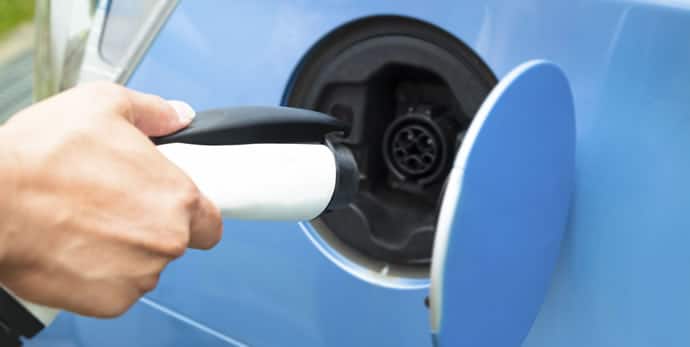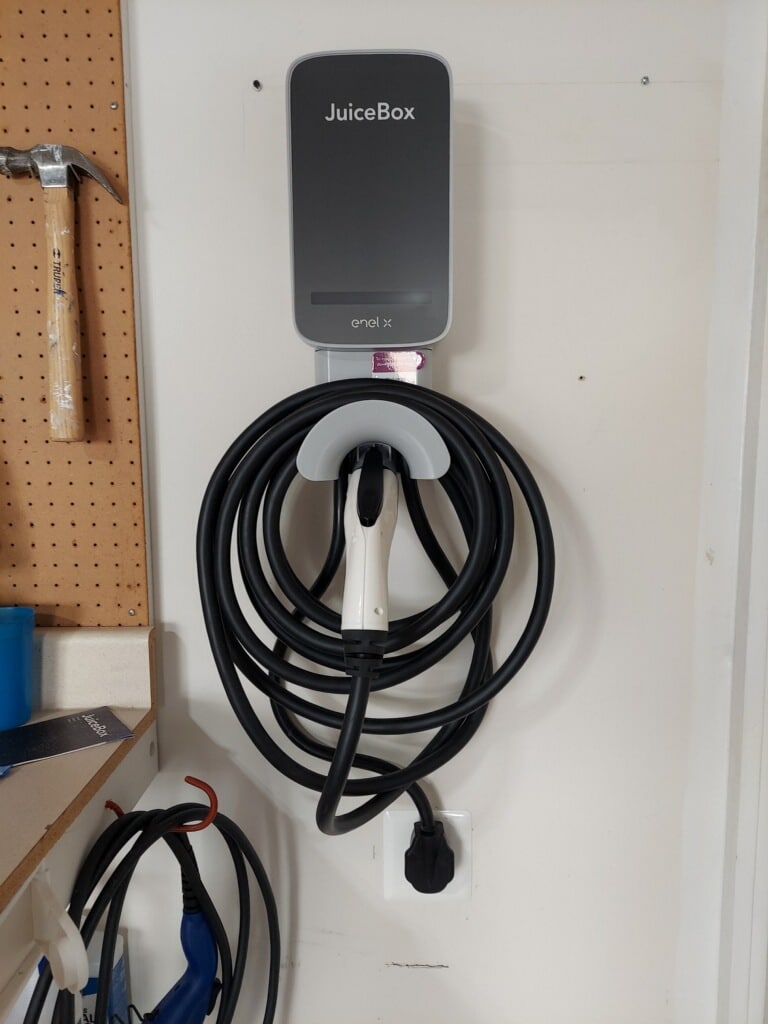
Electric Vehicle Charging Station Installation service in Northern Virginia
Demand for electric vehicles (EV) is on the rise around the world, and Northern Virginia is no exception. With improved technology, wider availability and more widely-available EV charging stations along the way, consumers and businesses that manage business fleets are bringing more electric vehicles into service every day. And with those electric vehicles, the demand for home electric car chargers and business electric car charging stations are increasing as well. Here, we will cover what you need to know about the EV charging installation service you’ll need to plug in safely and effectively.
Can I install an Electric Car Charger or EVSE Myself?
Never try to install an EVSE (electric vehicle supply equipment) by yourself. As with any other electrical work you need to have done at your home or office, you should always rely on your licensed electrician to do the work properly, safely and up to current code. Your electrician will need to check the wiring and establish that you have the proper circuitry installed to ensure safe and effective operation of the electric car charger. Although this may seem more expensive up front, the electric vehicle charging outlet installation service provided by Root Electric will keep you and your home and electric vehicle safe and prevent more expensive problems down the line. In fact, your electric car warranty, and the EV charger warranty may be voided if the EVSE is not properly installed by a licensed electrician in the first place, so don’t risk your safety over this!
Northern Virginia EV Charging Installation Service Details
Although there are more EV charging stations emerging across Northern Virginia, it can be hard to find a public one that’s free when you need it. That’s why it’s important, if you are thinking of buying an electric car, to settle the details of installing an electric car charging station at your home ahead of time, particularly for the model of car you plan to purchase. If you have a reliable EV charger at home, you can ensure that most of your daily electric car charging needs are met, reducing your reliance on outside options. We recommend that you ask your car dealer about the type of EV charger your target car would do best with, for there are many different models of electric car chargers out there. In fact, many electric cars now come with their own EVSE upon purchase. For instance, if you get a Tesla, you’ll want to install a Tesla charger. Some of the other electric cars out there that you might be looking into include:
- BMW i3 MCV and Active E
- Chevy Volt
- Chevy Spark EV
- Fiat 500e
- Ford Focus
- Ford F150 Lightning Pickup
- Honda Fit and Honda Accord Hybrid
- Mitsubishi i-MiEV
- Nissan LEAF
- Toyota Prius
- Tesla
Keep in mind that this list will continue to grow as time goes on, and there will continue to be developments in models of electric car chargers as well.
Types of EV Charging Stations
There are currently 3 types of EV charging stations. The type of EV charger you need depends on the type of vehicle you’re charging:
- Level 1—These are best for low-needs electric vehicles like golf carts. A level one charger can be plugged into any grounded 3-prong, 120-volt outlet, and it usually takes 20 or more hours to complete a full charge of the battery.
- Level 2—These are the ideal home electric car charging ports, and you need to have a dedicated 240-volt circuit installed in your garage, by your electrician, for safe and efficient charging. These electric car chargers should juice up your car’s battery in approximately 3 hours. Naturally, they’re more expensive than Level 1 chargers, but they make more sense if you are dedicated to using your electric vehicle on a regular basis.
- Level 3—These are for industrial and commercial locations and draw a lot of electricity, so they need special installation. Public car chargers are typically level 3 chargers. They can add about 160 miles to a vehicle’s battery in just 30 minutes. If you have a business that manages a fleet of electric vehicles, contact your Northern Virginia commercial electrician to have these installed safely and correctly.
Electric Vehicle Charging Outlet Installation
For most homeowners with an electric vehicle, you’ll need to have a Level 2 EVSE installed on a dedicated circuit that can provide 20-100 amps. In other words, the circuit should handle the same type of 240-volts that most other major appliances require, such as a clothes dryer, washing machine, refrigerator or electric oven. Your electrician will need to check that you have enough circuits available, and to install one if you don’t already have enough. If you live in an older home, you may also need some other electrical upgrades to prevent any fire or shock risks.
Can I Move My EVSE Port If I Move?
Yes, you can. In fact, Root Electric can install your EVSE port either indoors or outdoors, convenient to the location where you normally park the car. If you move, the EV charger can be moved to your new home. If your new home is still here in Northern Virginia, our licensed electricians should also check that your new home has the correct circuits and wiring installed, and that your home’s electrical system is safe for plugging in and charging your electric car.
Before Contacting Root Electric About Your New Electric Vehicle:
- Know the available methods of charging for your specific make and model. Every vehicle is engineered differently and has different installation requirements.
- If you would like to use a power connector, purchase the power connector and have it on hand before your estimating appointment.
- Know who your electric service provider is and if they offer special programs for electric vehicle charging.
- Know all of your neighborhood covenants regarding installation of outlets and charging stations on the exterior of your home (if you intend to install the power connector or power plug on the exterior of the home).
- Know where the car will be parked and in what position. (i.e. do you back in to your garage or pull straight-in?)
- Do you plan to purchase additional electric vehicles in the future? How will this impact the way you schedule charging for your vehicles? (Read FAQs About Electric Vehicles Here)
Types of EV Charger Connections: (Some may not be available, depending on the brand of the vehicle.)
- Basic 120 volt wall outlet: 20 Amp dedicated circuit with GFCI protection recommended for reliable operation. Lowest cost for installation, but results in longer charging times.
- Heavy duty 240 volt wall outlet: Up to 40 Amps, dedicated circuit for shorter charging times. This option eliminates the need to purchase a power connector (depending on the make and model) and can charge your vehicle between four and six times faster than a 120 volt wall outlet. In many cases, this method of installation will require replacement of the main electrical panel or upgrade of the existing electrical service. Most homes built in the 1980’s or later may not require an electrical panel replacement or service upgrade.
- Manufacturer-Supplied Power Connector: These units can provide between 15 Amps and 80 Amps of charging capacity and will yield the fastest charging times depending on the brand and configuration of your electric vehicle. Some power connectors are proprietary to the brand of vehicle, and some are manufactured by main line equipment manufacturers such as GE, Siemens, or Bosch. Because of the extremely high charging capacity of a power connector, installation will require upgrade of the home’s electrical service and replacement of the main electrical panel in most cases. To maximize the benefit of a power connector, a dedicated power company meter can be installed, allowing the owner to take advantage of special electricity rates, depending on the power company.
Dedicated Electric Vehicle Meter
- Not every power company offers the option of having a dedicated meter for your electric vehicle. Check with your power company for availability.
- You must have a minimum of 200 Amps at your meter. If your existing service and electrical panel are rated below 200 amps, the service and electrical panel will need to be upgraded.
- Installation methods differ depending on the size of service you have. Installation for a 200 amp service is different from that of a 300/400 amp service, and installation for services rated at 600 amps and above are also different. Root Electric has the experience to determine the best installation method for your service.
Is Maintenance Necessary for EV Chargers?
Certainly! Just as with any equipment or technological device, regular upkeep for EV chargers is paramount. Here's the rationale:
Peak Efficiency: Consistent maintenance guarantees your charger operates at peak efficiency. This translates to not only quicker and more dependable charging but also judicious use of electricity.
Safety Measures: Chargers subjected to regular use can pose safety threats if left unchecked. Compromised cables or malfunctioning connectors might precipitate accidents or, in dire circumstances, fires.
Enhanced Durability: Even though EV chargers are designed for durability, habitual inspections can extend their operational life. Neglecting trivial issues today can evolve into substantial complications tomorrow, necessitating expensive interventions or replacements.
Economic Advantages: Taking a preventive approach to maintenance allows you to detect and address budding issues before they balloon into larger, cost-intensive challenges.
Assured Reliability: The comfort of knowing that your charger is in optimal shape is invaluable, more so when it's crucial for daily travels or extended journeys.
Read more about EV Charging Maintenance Tips.
Call Your Northern Virginia Electric Car Charging Station Installation Experts
Contact Root Electric today to discuss your electric car charging installation needs, whether you need a Level 2 EVSE installed at home, or you run a business that needs Level 3 charging stations for a fleet or for your customers: (703) 494-3989.Like to learn more about Electric Vehicles? Read FAQs Here.
REQUEST A FREE QUOTE
Satisfaction / Safety First Since 1986

JuiceBox Level 2 EV charger installation.
